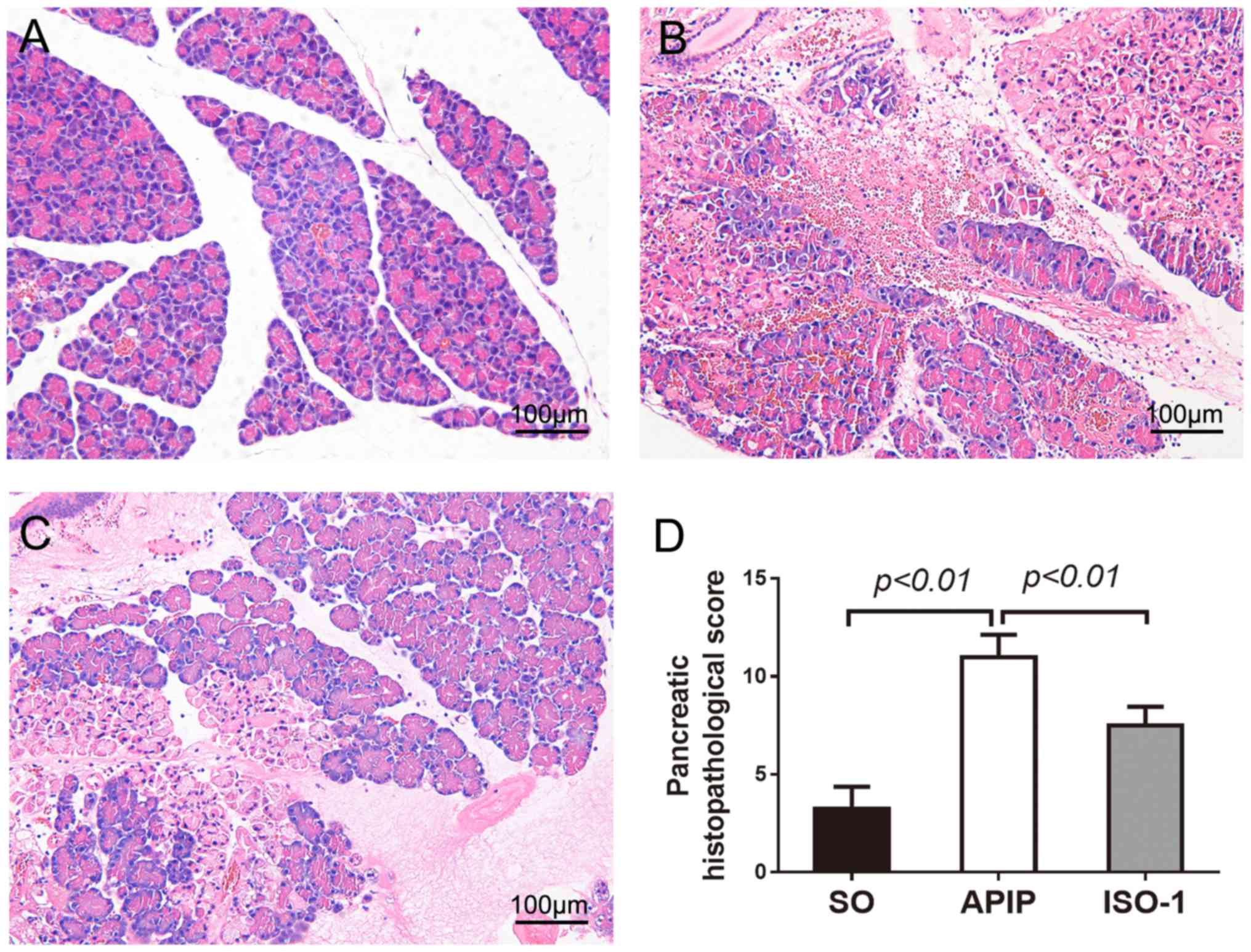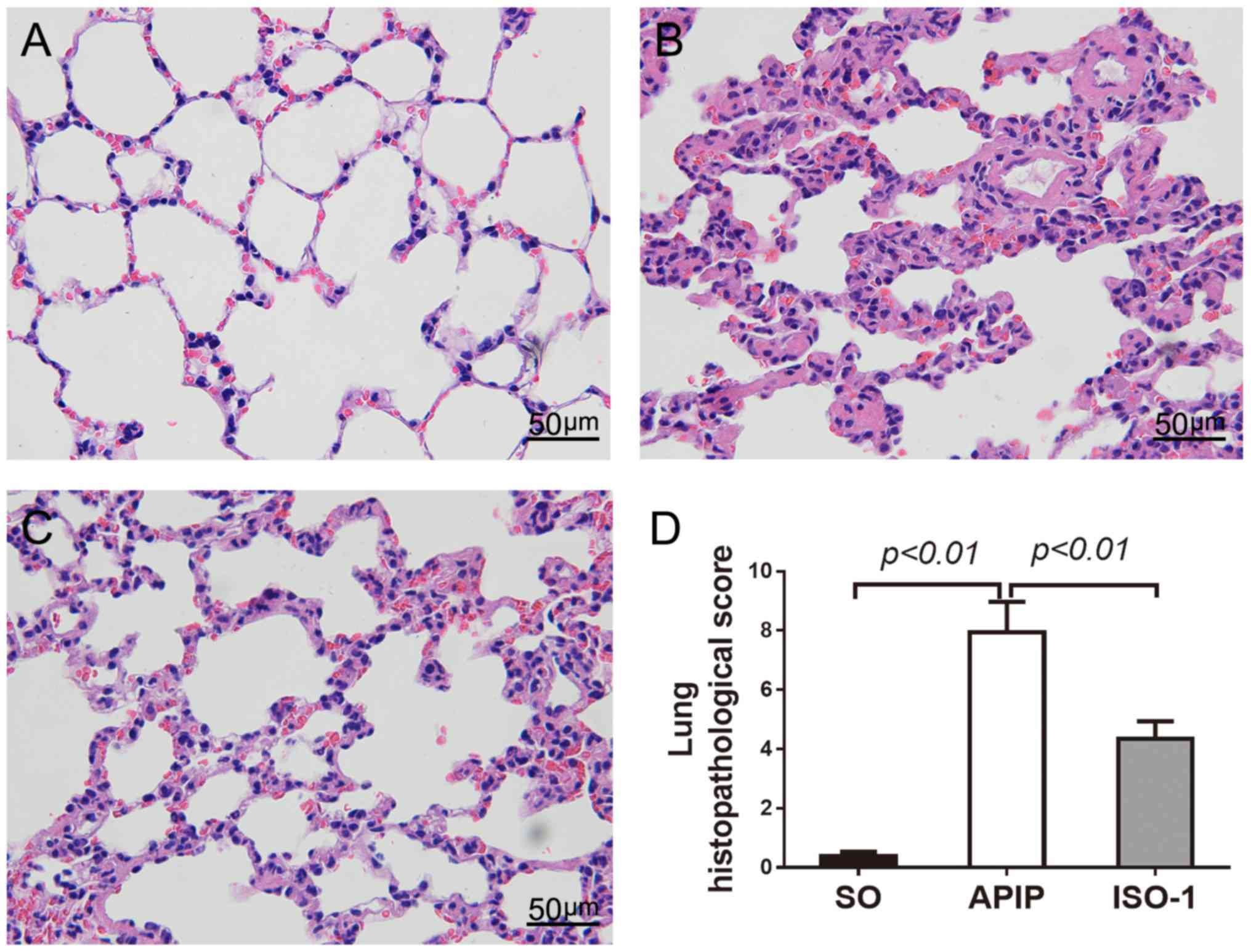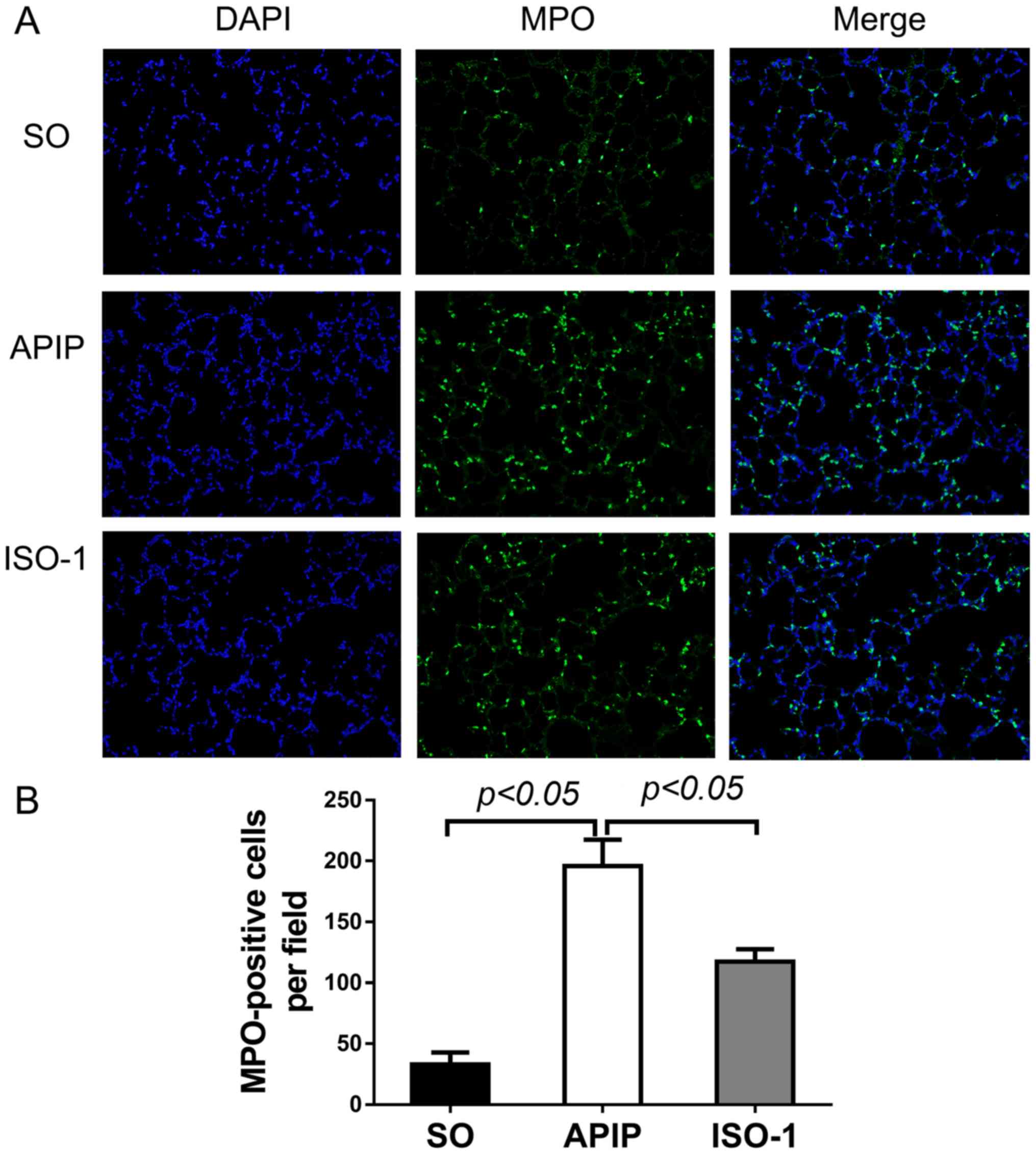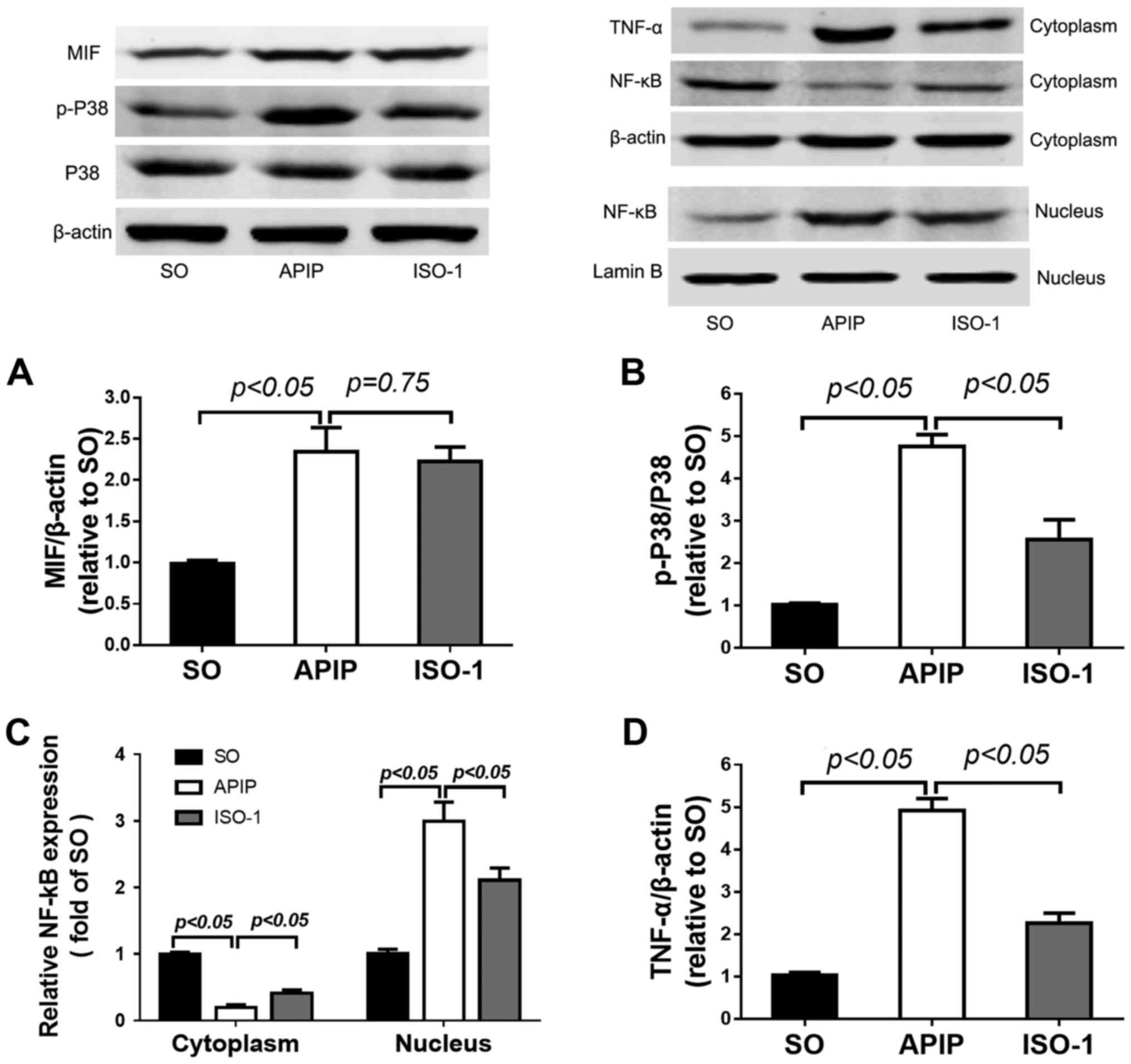|
1
|
Mali P: Pancreatitis in pregnancy:
Etiology, diagnosis, treatment, and outcomes. Hepatobiliary
Pancreat Dis Int. 15:434–438. 2016. View Article : Google Scholar : PubMed/NCBI
|
|
2
|
Zuo T, Yu J, Wang WX, Zhao KL, Chen C,
Deng WH, He XB, Wang P, Shi Q and Guo WY: Mitogen-activated protein
kinases are activated in placental injury in rat model of acute
pancreatitis in pregnancy. Pancreas. 45:850–857. 2016. View Article : Google Scholar : PubMed/NCBI
|
|
3
|
Akcakaya A, Ozkan OV, Okan I, Kocaman O
and Sahin M: Endoscopic retrograde cholangiopancreatography during
pregnancy without radiation. World J Gastroenterol. 15:3649–3652.
2009. View Article : Google Scholar : PubMed/NCBI
|
|
4
|
Hernandez A, Petrov MS, Brooks DC, Banks
PA, Ashley SW and Tavakkolizadeh A: Acute pancreatitis and
pregnancy: A 10-year single center experience. J Gastrointest Surg.
11:1623–1627. 2007. View Article : Google Scholar : PubMed/NCBI
|
|
5
|
Halonen KI, Pettilä V, Leppäniemi AK,
Kemppainen EA, Puolakkainen PA and Haapiainen RK: Multiple organ
dysfunction associated with severe acute pancreatitis. Crit Care
Med. 30:1274–1279. 2002. View Article : Google Scholar : PubMed/NCBI
|
|
6
|
Mole DJ, Webster SP, Uings I, Zheng X,
Binnie M, Wilson K, Hutchinson JP, Mirguet O, Walker A, Beaufils B,
et al: Kynurenine-3-monooxygenase inhibition prevents multiple
organ failure in rodent models of acute pancreatitis. Nat Med.
22:202–209. 2016. View
Article : Google Scholar : PubMed/NCBI
|
|
7
|
Elder AS, Saccone GT and Dixon DL: Lung
injury in acute pancreatitis: Mechanisms underlying augmented
secondary injury. Pancreatology. 12:49–56. 2012. View Article : Google Scholar : PubMed/NCBI
|
|
8
|
Pastor CM, Matthay MA and Frossard JL:
Pancreatitis-associated acute lung injury: New insights. Chest.
124:2341–2351. 2003. View Article : Google Scholar : PubMed/NCBI
|
|
9
|
Jaffray C, Yang J, Carter G, Mendez C and
Norman J: Pancreatic elastase activates pulmonary nuclear factor
kappa B and inhibitory kappa B, mimicking pancreatitis-associated
adult respiratory distress syndrome. Surgery. 128:225–231. 2000.
View Article : Google Scholar : PubMed/NCBI
|
|
10
|
Lu H and Bai Y, Wu L, Hong W, Liang Y,
Chen B and Bai Y: Inhibition of macrophage migration inhibitory
factor protects against inflammation and matrix deposition in
kidney tissues after injury. Mediat Inflamm. 2016:21746822016.
View Article : Google Scholar
|
|
11
|
Leng L, Metz CN, Fang Y, Xu J, Donnelly S,
Baugh J, Delohery T, Chen Y, Mitchell RA and Bucala R: MIF signal
transduction initiated by binding to CD74. J Exp Med.
197:1467–1476. 2003. View Article : Google Scholar : PubMed/NCBI
|
|
12
|
Lue H, Thiele M, Franz J, Dahl E,
Speckgens S, Leng L, Fingerle-Rowson G, Bucala R, Lüscher B and
Bernhagen J: Macrophage migration inhibitory factor (MIF) promotes
cell survival by activation of the Akt pathway and role for
CSN5/JAB1 in the control of autocrine MIF activity. Oncogene.
26:5046–5059. 2007. View Article : Google Scholar : PubMed/NCBI
|
|
13
|
Gao Y, Hou R, Liu F, Liu H, Fei Q, Han Y,
Cai R, Peng C and Qi Y: Obacunone causes sustained expression of
MKP-1 thus inactivating p38 MAPK to suppress pro-inflammatory
mediators through intracellular MIF. J Cell Biochem. 119:837–849.
2018. View Article : Google Scholar : PubMed/NCBI
|
|
14
|
Roger T, Schneider A, Weier M, Sweep FC,
Le Roy D, Bernhagen J, Calandra T and Giannoni E: High expression
levels of macrophage migration inhibitory factor sustain the innate
immune responses of neonates. Proc Natl Acad Sci USA. 113:pp.
E997–E1005. 2016; View Article : Google Scholar : PubMed/NCBI
|
|
15
|
Aeberli D, Leech M and Morand EF:
Macrophage migration inhibitory factor and glucocorticoid
sensitivity. Rheumatology (Oxford). 45:937–943. 2006. View Article : Google Scholar : PubMed/NCBI
|
|
16
|
Calandra T, Echtenacher B, Roy DL, Pugin
J, Metz CN, Hültner L, Heumann D, Männel D, Bucala R and Glauser
MP: Protection from septic shock by neutralization of macrophage
migration inhibitory factor. Nat Med. 6:164–170. 2000. View Article : Google Scholar : PubMed/NCBI
|
|
17
|
Al-Abed Y, Dabideen D, Aljabari B, Valster
A, Messmer D, Ochani M, Tanovic M, Ochani K, Bacher M, Nicoletti F,
et al: ISO-1 binding to the tautomerase active site of MIF inhibits
its pro-inflammatory activity and increases survival in severe
sepsis. J Biol Chem. 280:36541–36544. 2005. View Article : Google Scholar : PubMed/NCBI
|
|
18
|
Bozza FA, Gomes RN, Japiassú AM, Soares M,
Castro-Faria-Neto HC, Bozza PT and Bozza MT: Macrophage migration
inhibitory factor levels correlate with fatal outcome in sepsis.
Shock. 22:309–313. 2004. View Article : Google Scholar : PubMed/NCBI
|
|
19
|
Mikulowska A, Metz CN, Bucala R and
Holmdahl R: Macrophage migration inhibitory factor is involved in
the pathogenesis of collagen type II-induced arthritis in mice. J
Immunol. 158:5514–5517. 1997.PubMed/NCBI
|
|
20
|
Amano T, Nishihira J and Miki I: Blockade
of macrophage migration inhibitory factor (MIF) prevents the
antigen-induced response in a murine model of allergic airway
inflammation. Inflamm Res. 56:24–31. 2007. View Article : Google Scholar : PubMed/NCBI
|
|
21
|
Ohkawara T, Nishihira J, Takeda H, Hige S,
Kato M, Sugiyama T, Iwanaga T, Nakamura H, Mizue Y and Asaka M:
Amelioration of dextran sulfate sodium-induced colitis by
anti-macrophage migration inhibitory factor antibody in mice.
Gastroenterology. 123:256–270. 2002. View Article : Google Scholar : PubMed/NCBI
|
|
22
|
Russell KE, Chung KF, Clarke CJ, Durham
AL, Mallia P, Footitt J, Johnston SL, Barnes PJ, Hall SR, Simpson
KD, et al: The MIF antagonist ISO-1 attenuates
corticosteroid-insensitive inflammation and airways
hyperresponsiveness in an ozone-induced model of COPD. PLoS One.
11:e1461022016. View Article : Google Scholar
|
|
23
|
West PW, Parker LC, Ward JR and Sabroe I:
Differential and cell-type specific regulation of responses to
Toll-like receptor agonists by ISO-1. Immunology. 125:101–110.
2008. View Article : Google Scholar : PubMed/NCBI
|
|
24
|
Yu J, Deng W, Wang W, Ding Y, Jin H, Chen
C, Chen X, Xiong X and Xu S: Inhibition of poly(ADP-ribose)
polymerase attenuates acute kidney injury in sodium
taurocholate-induced acute pancreatitis in rats. Pancreas.
41:1299–1305. 2012. View Article : Google Scholar : PubMed/NCBI
|
|
25
|
Mei F, Shi Q, Zuo T, Chen C, Wang P, Li C,
He B, Yang X, Hu P and Wang W: Dose-effect relationship and
protective effect of MIF inhibitor on pancreas and placenta
injuries in rats with acute necrotizing pancreatitis in late
pregnancy. Chin J Emerg Med. 25:45–49. 2016.
|
|
26
|
Schmidt J, Rattner DW, Lewandrowski K,
Compton CC, Mandavilli U, Knoefel WT and Warshaw AL: A better model
of acute pancreatitis for evaluating therapy. Ann Surg. 215:44–56.
1992. View Article : Google Scholar : PubMed/NCBI
|
|
27
|
Werner J, Z'Graggen K, Fernández-del
Castillo C, Lewandrowski KB, Compton CC and Warshaw AL: Specific
therapy for local and systemic complications of acute pancreatitis
with monoclonal antibodies against ICAM-1. Ann Surg. 229:834–842.
1999. View Article : Google Scholar : PubMed/NCBI
|
|
28
|
Sha H, Ma Q, Jha RK and Wang Z:
Resveratrol ameliorates lung injury via inhibition of apoptosis in
rats with severe acute pancreatitis. Exp Lung Res. 35:344–358.
2009. View Article : Google Scholar : PubMed/NCBI
|
|
29
|
Nishiki Y, Adewola A, Hatanaka M, Templin
AT, Maier B and Mirmira RG: Translational control of inducible
nitric oxide synthase by p38 MAPK in islet β-cells. Mol Endocrinol.
27:336–349. 2013. View Article : Google Scholar : PubMed/NCBI
|
|
30
|
Que RS, Cao LP, Ding GP, Hu JA, Mao KJ and
Wang GF: Correlation of nitric oxide and other free radicals with
the severity of acute pancreatitis and complicated systemic
inflammatory response syndrome. Pancreas. 39:536–540. 2010.
View Article : Google Scholar : PubMed/NCBI
|
|
31
|
Kim K, Li Y, Jin G, Chong W, Liu B, Lu J,
Lee K, Demoya M, Velmahos GC and Alam HB: Effect of valproic acid
on acute lung injury in a rodent model of intestinal ischemia
reperfusion. Resuscitation. 83:243–248. 2012. View Article : Google Scholar : PubMed/NCBI
|
|
32
|
Bargagli E, Olivieri C, Nikiforakis N,
Cintorino M, Magi B, Perari MG, Vagaggini C, Spina D, Prasse A and
Rottoli P: Analysis of macrophage migration inhibitory factor (MIF)
in patients with idiopathic pulmonary fibrosis. Respir Physiol
Neurobiol. 167:261–267. 2009. View Article : Google Scholar : PubMed/NCBI
|
|
33
|
Heinrichs D, Knauel M, Offermanns C,
Berres ML, Nellen A, Leng L, Schmitz P, Bucala R, Trautwein C,
Weber C, et al: Macrophage migration inhibitory factor (MIF) exerts
antifibrotic effects in experimental liver fibrosis via CD74. Proc
Natl Acad Sci USA. 108:pp. 17444–17449. 2011; View Article : Google Scholar : PubMed/NCBI
|
|
34
|
Jaworek J, Jachimczak B, Tomaszewska R,
Konturek PC, Pawlik WW, Sendur R, Hahn EG, Stachura J and Konturek
SJ: Protective action of lipopolysaccharidesin rat
caerulein-induced pancreatitis: Role of nitric oxide. Digestion.
62:1–13. 2000. View Article : Google Scholar : PubMed/NCBI
|
|
35
|
Gao Y, Liu F, Fang L, Cai R, Zong C and Qi
Y: Genkwanin inhibits proinflammatory mediators mainly through the
regulation of miR-101/MKP-1/MAPK pathway in LPS-activated
macrophages. PLoS One. 9:e967412014. View Article : Google Scholar : PubMed/NCBI
|
|
36
|
Choi SB, Bae GS, Jo IJ, Wang S, Song HJ
and Park SJ: Berberine inhibits inflammatory mediators and
attenuates acute pancreatitis through deactivation of JNK signaling
pathways. Mol Immunol. 74:27–38. 2016. View Article : Google Scholar : PubMed/NCBI
|
|
37
|
Geng Y, Li W, Sun L, Tong Z, Li N and Li
J: Severe acute pancreatitis during pregnancy: Eleven years
experience from a surgical intensive care unit. Dig Dis Sci.
56:3672–3677. 2011. View Article : Google Scholar : PubMed/NCBI
|
|
38
|
Stimac D and Stimac T: Acute pancreatitis
during pregnancy. Eur J Gastroenterol Hepatol. 23:839–844. 2011.
View Article : Google Scholar : PubMed/NCBI
|
|
39
|
Hacker FM, Whalen PS, Lee VR and Caughey
AB: Maternal and fetal outcomes of pancreatitis in pregnancy. Am J
Obstet Gynecol. 213:568.e1–5. 2015. View Article : Google Scholar
|
|
40
|
Robertson KW, Stewart IS and Imrie CW:
Severe acute pancreatitis and pregnancy. Pancreatology. 6:309–315.
2006. View Article : Google Scholar : PubMed/NCBI
|
|
41
|
Rahman SH, Menon KV, Holmfield JH, McMahon
MJ and Guillou JP: Serum macrophage migration inhibitory factor is
an early marker of pancreatic necrosis in acute pancreatitis. Ann
Surg. 245:282–289. 2007. View Article : Google Scholar : PubMed/NCBI
|
|
42
|
Barnes MA, McMullen MR, Roychowdhury S,
Pisano SG, Liu X, Stavitsky AB, Bucala R and Nagy LE: Macrophage
migration inhibitory factor contributes to ethanol-induced liver
injury by mediating cell injury, steatohepatitis, and steatosis.
Hepatology. 57:1980–1991. 2013. View Article : Google Scholar : PubMed/NCBI
|
|
43
|
Lai KN, Leung JC, Metz CN, Lai FM, Bucala
R and Lan HY: Role for macrophage migration inhibitory factor in
acute respiratory distress syndrome. J Pathol. 199:496–508. 2003.
View Article : Google Scholar : PubMed/NCBI
|
|
44
|
Norman J, Franz M, Messina J, Riker A,
Fabri PJ, Rosemurgy AS and Gower WR Jr: Interleukin-1 receptor
antagonist decreases severity of experimental acute pancreatitis.
Surgery. 117:648–655. 1995. View Article : Google Scholar : PubMed/NCBI
|
|
45
|
Hughes CB, Grewal HP, Gaber LW, Kotb M,
El-din AB, Mann L and Gaber AO: Anti-TNFalpha therapy improves
survival and ameliorates the pathophysiologic sequelae in acute
pancreatitis in the rat. Am J Surg. 171:274–280. 1996. View Article : Google Scholar : PubMed/NCBI
|
|
46
|
Baker SJ and Reddy EP: Transducers of life
and death: TNF receptor superfamily and associated proteins.
Oncogene. 12:1–9. 1996.PubMed/NCBI
|
|
47
|
Papachristou GI: Prediction of severe
acute pancreatitis: Current knowledge and novel insights. World J
Gastroenterol. 14:6273–6275. 2008. View Article : Google Scholar : PubMed/NCBI
|
|
48
|
Lukacs NW and Ward PA: Inflammatory
mediators, cytokines, and adhesion molecules in pulmonary
inflammation and injury. Adv Immunol. 62:257–304. 1996. View Article : Google Scholar : PubMed/NCBI
|
|
49
|
Chen C, Xu S, Wang WX, Ding YM, Yu KH,
Wang B and Chen XY: Rosiglitazone attenuates the severity of sodium
taurocholate-induced acute pancreatitis and pancreatitis-associated
lung injury. Arch Med Res. 40:79–88. 2009. View Article : Google Scholar : PubMed/NCBI
|
|
50
|
Twait E, Williard DE and Samuel I:
Dominant negative p38 mitogen-activated protein kinase expression
inhibits NF-kappaB activation in AR42J cells. Pancreatology.
10:119–128. 2010. View Article : Google Scholar : PubMed/NCBI
|
|
51
|
Lv W, Lv C, Yu S, Yang Y, Kong H, Xie J,
Sun H, Andersson R, Xu D, Chen B and Zhou M: Lipoxin A4 attenuation
of endothelial inflammation response mimicking pancreatitis-induced
lung injury. Exp Biol Med (Maywood). 238:1388–1395. 2013.
View Article : Google Scholar : PubMed/NCBI
|
|
52
|
Chen P, Zhang Y, Qiao M and Yuan Y:
Activated protein C, an anticoagulant polypeptide, ameliorates
severe acute pancreatitis via regulation of mitogen-activated
protein kinases. J Gastroenterol. 42:887–896. 2007. View Article : Google Scholar : PubMed/NCBI
|
|
53
|
Zhong H, SuYang H, Erdjument-Bromage H,
Tempst P and Ghosh S: The transcriptional activity of NF-kappaB is
regulated by the IkappaB-associated PKAc subunit through a cyclic
AMP-independent mechanism. Cell. 89:413–424. 1997. View Article : Google Scholar : PubMed/NCBI
|
|
54
|
Yubero S, Ramudo L, Manso MA and De Dios
I: Mechanisms of dexamethasone-mediated chemokine down-regulation
in mild and severe acute pancreatitis. Biochim Biophys Acta.
1792:1205–1211. 2009. View Article : Google Scholar : PubMed/NCBI
|
|
55
|
Kim C, Sano Y, Todorova K, Carlson BA,
Arpa L, Celada A, Lawrence T, Otsu K, Brissette JL, Arthur JS and
Park JM: The kinase p38 alpha serves cell type-specific
inflammatory functions in skin injury and coordinates pro- and
anti-inflammatory gene expression. Nat Immunol. 9:1019–1027. 2008.
View Article : Google Scholar : PubMed/NCBI
|




















